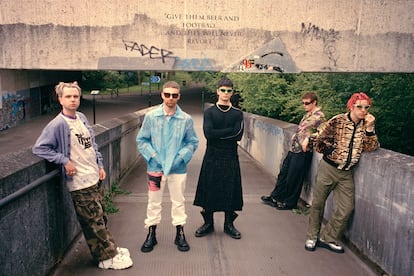Fontaines DC’s bid to shape the future of rock
The Irish band returns with ‘Romance,’ their fourth album — a shift in sound and aesthetics with the emphasis on guitar

The release of Romance, the fourth full-length album from Irish quintet Fontaines DC, was still three months away when EL PAÍS met with vocalist English-born Grian Chatten, 29, at his label’s offices in Madrid. All anyone knew then was the album’s title, with a taster of what was to come from the single, the supersonic Starbuster.
New photos of the band distributed by the label indicated radical change. Basically, where before there was no aesthetic at all, a very late 1990s look had been added, with fluorine colors, fly glasses and inflammable fabrics that should be forbidden in gas stations. The press release that began to circulate spoke of nu metal and 1990s electronica influences, like The Prodigy. The feeling was that Fontaines DC were going to be the most important rock band of 2024 and beyond. At the end of August, the album came out and almost everything was confirmed.
“It was an effort,” Chatten says, predicting success. “I think we had potential, but we hadn’t found the time or the way to make the leap to help change rock.” Sitting in a small chair that wobbles disconcertingly on a Madrid rooftop, Chatten is dressed in the style of the promotional photos. “Before I could spend two weeks on tour in the same plaid shirt,” confesses the singer, whose family moved to Ireland when he was a baby. “Trying to create a universe with the album, we are using colors — I don’t want to be that person who has colorful influences in his music but always wears a gray shirt.”
Five years ago, when Fontaines DC burst onto the scene with Drogel, their debut album, no one would have looked twice at their clothes. The threads were irrelevant because they were a furious post-punk band aiming to lead the third revival of the genre, armed with an album by The Fall and a book by Dylan Thomas. “Dublin in the rain is mine / A pregnant city with a Catholic mind.” These were the first verses of Big, the opening track of that first album. Barely 18 months later, the band released their second album, a somewhat more obscure effort, with hardly any vocal melodies and instrumental riffs that suggested they had a great time rehearsing.
They weren’t number one in the U.K. in 2020 because Taylor Swift changed the date of the physical release of Folklore when she saw that Fontaines DC were selling twice as many albums as her. No one was bothered about how they dressed then either. And in the spring of 2022 came Skinty Fia, the album that turned them into something different with experimental new sounds — in this case 1990s indie, shoegaze and the legacy of bands like Whipping Boy — and the success of that album is perceptible in Romance.
Skinty Fia also marked the moment that Chatten decided it was time to actually sing. “My solo album [Chaos For The Fly, 2023] helped me a lot as a vocalist. I found the music that suits my voice best — songs with strings and a 1960s sound that challenged me as a singer and helped me find my range. I learned to love my voice, and not just because people started laughing at the jokes I made with it.”
Around that time, Chatten began to suffer from panic attacks. These were significant enough to end up in the Romance press release, even though they are now a thing of the past. “I wasn’t sure if we should mention it,” he says. “On my solo album there was a lot of darkness and I got asked a lot about mental health. Then I thought I sounded like a bitter fuck all the time. And reading interviews from those months scared me. I want to tell people I’m having a good time — it’s important.”
Now he’s reading Dylan Thomas again and is proud about getting all the way through Albert Camus: “I managed to finish reading Camus’s The Outsider. Can you believe I lost four copies of that book before I could read it in its entirety?”
The singer knows that having a rock band in an era dominated by individualistic pop is difficult. What makes it more complicated is the quest by the music industry to foster a monoculture, reducing the dominant styles to two or three in an effort to prevent anything that hasn’t been created and controlled by it to become successful.
“It costs a lot of money to get this stuff moving. It’s fucked up for working class kids. Everything is very expensive, and you earn very little. I don’t know how it is in other places, but where we come from, many small venues have closed and that makes everything difficult. At this juncture, you can only have a band with people you consider friends.”
Last year, the group toured with the Arctic Monkeys, perhaps the band whose sound and aesthetic evolution most resembles their own. Both have reached the point where they can make an album that feels needed. Listening to the latest Arctic Monkeys or Fontaines DC albums is a bit like voting for Kamala Harris. “Playing with the Arctic Monkeys was good to define us in relation to them. It was nice to share the stage. To see what they do and, through that, to know what we can and want to do. It was amazing to be there at their concerts, which are huge. They take it very seriously. So do we, but we’re still very anarchic,” says Chatten.
Chatten left Dublin some time ago. The city had been his muse. He had been madly in love with it in his post-adolescence, when there was poetry, something to do, something to write about on every corner. But his friends left, and so did he. He went to London. “It’s not bad living there,” he says. “I’ve moved with my partner to a smaller apartment. There are savings to be made. And, anyway, I’m going to be touring a lot. At first, it was going to be a low-profile tour, with 26 festivals in the summer and, well, it’s getting complicated.”
For Chatten, being Irish in London with its large Irish community helps him to explore his roots while also forgetting about them to an extent. “I don’t want to be defined by being Irish, but I don’t want to forget either. And if I forget there’s always someone to remind me, like the other day when I was coming out of a sauna, and some guys ask me if I’m in the IRA because of some fucking tattoo they claim to have seen on me. All of a sudden, I get scared because I think I’m going to get beaten up, but at the same time I come out of there feeling very Irish.”
Sign up for our weekly newsletter to get more English-language news coverage from EL PAÍS USA Edition
Tu suscripción se está usando en otro dispositivo
¿Quieres añadir otro usuario a tu suscripción?
Si continúas leyendo en este dispositivo, no se podrá leer en el otro.
FlechaTu suscripción se está usando en otro dispositivo y solo puedes acceder a EL PAÍS desde un dispositivo a la vez.
Si quieres compartir tu cuenta, cambia tu suscripción a la modalidad Premium, así podrás añadir otro usuario. Cada uno accederá con su propia cuenta de email, lo que os permitirá personalizar vuestra experiencia en EL PAÍS.
¿Tienes una suscripción de empresa? Accede aquí para contratar más cuentas.
En el caso de no saber quién está usando tu cuenta, te recomendamos cambiar tu contraseña aquí.
Si decides continuar compartiendo tu cuenta, este mensaje se mostrará en tu dispositivo y en el de la otra persona que está usando tu cuenta de forma indefinida, afectando a tu experiencia de lectura. Puedes consultar aquí los términos y condiciones de la suscripción digital.









































